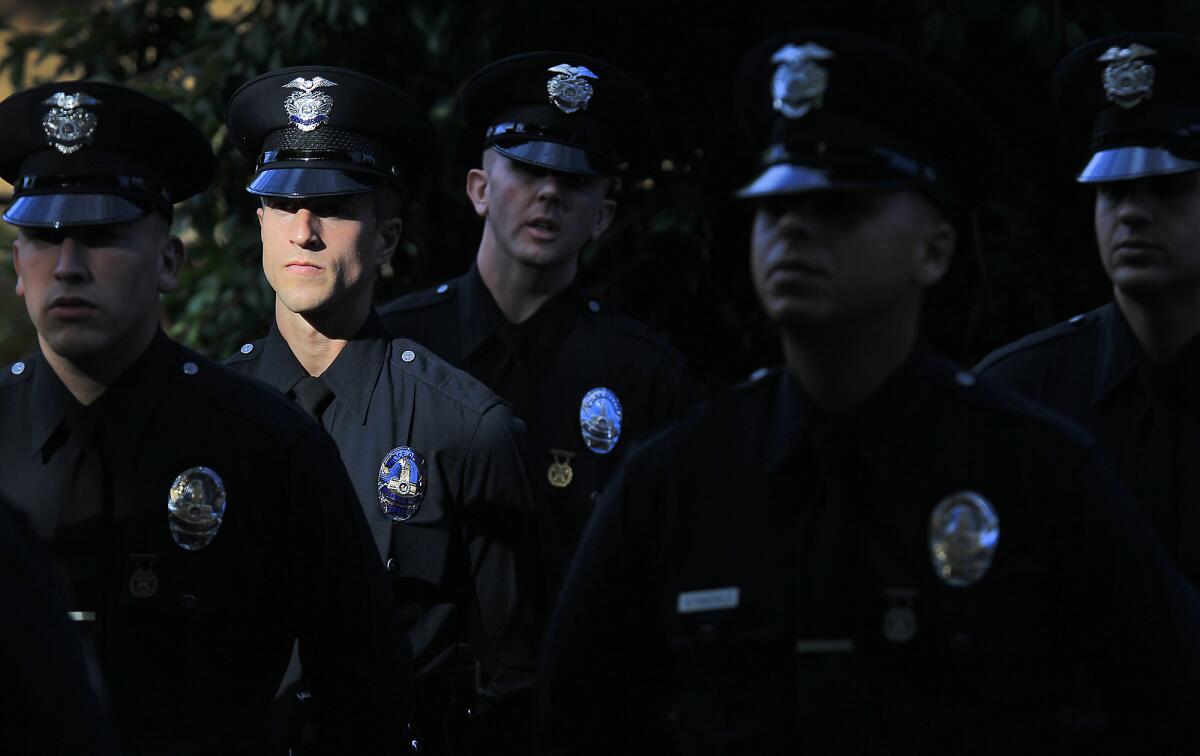Faced with shrinking ranks, LAPD looks to rehire retired officers

- Share via
The Los Angeles Police Department is making a simple but unusual pitch to its retired officers: Come back. Please.
Faced with a flood of departures and a trickle of recruits entering its training academy that have led to dwindling staffing levels, LAPD officials have drawn up plans that call for as many as 200 retired police officers to be rehired. On the campaign trail in her recent race for mayor, Karen Bass pledged to rebuild the department’s ranks to 9,700 officers as the city confronts violent crime rates that remain above pre-pandemic levels.
Bass didn’t say how quickly she wanted to reach her goal, but, with about 9,200 officers currently on the force and the department failing to attract enough recruits to keep up with the pace of attrition, making good on her promise anytime soon will be very difficult. About 600 officers are expected to retire or leave for other reasons in the next year — about 20% higher than the typical departure rate, LAPD Chief Michel Moore said.
As a stopgap measure, the department hopes a rarely used bureaucratic mechanism will allow it to regain lost ground. Known informally as the “bounce program,” it allows the chief of police to bring retired officers back for up to a year. It typically has been used sparingly in the past to recall an individual officer whose specialized skill sets make them hard to replace, such as a homicide detective who retired while working a case that might otherwise fall apart without their involvement.
Now, however, the department wants to use the strategy on a wholesale level to hire back dozens of officers.
“This would allow us to bring back police officers, detectives and sergeants so that they could work for up to one year,” Moore said in an interview this week. “It’s a short-term, interim strategy. It’s not one that I would like to see us become dependent on.”
The ideal candidates would have retired or resigned within the last six months and left the department in good standing, he said. Only those who are up to date with the training certifications required to serve would be eligible to return. Officers would be paid the salary they had when they left but wouldn’t receive vacation time or any health, disability and retirement benefits, he said.
A similar recall effort was tried in 2007 or 2008, in the midst of a massive hiring spree as the department raced to keep pace with former Mayor Antonio Villaraigosa’s goal of reaching 10,000 officers, Moore said. The city eventually reached that mark, but it took 10 years.
Under the terms of the bounce program, officers who return to duty would continue to collect pension payments while also earning a paycheck. Whether retired officers who rejoin the department would also have to reactivate membership in the unions representing LAPD officers and pay dues wasn’t clear.
In addition to the proposal to rehire officers, the department is pursuing more traditional solutions to getting more officers into the field.
It has asked the City Council to include $119 million in its budget to hire 780 recruits in the next fiscal year, which runs from July 1 through June 30. But department officials acknowledge the ambitious hiring target may be unrealistic. To meet its goal, the LAPD would have to usher 13 classes of recruits through its training academy with 60 aspiring cops in each class — numbers that have been unreachable as of late.
Last month, Moore told the Police Commission that recent classes have averaged only about 34 candidates, a meager enrollment, that combined with the higher-than-expected attrition rates, is “posing a substantial challenge for us.”
The next academy class to graduate has just 22 recruits.
The department has stepped up its marketing efforts, hiring a web analytics comany to track how often someone clicks on the recruiting link on the LAPD’s website and better target people with online job postings. The department has also stepped up its recruiting at historically Black colleges and universities back East in hopes of improving diversity among its officers.
Moore and other officials have blamed the falloff in recruits to anti-police sentiment that grew after the law enforcement killings of George Floyd and other Black Americans, as well as a severe backlog of background investigations that keeps potential recruits waiting months for a spot in the academy.
At a community forum in November, Moore said the strong economy, in which other, less dangerous jobs are abundant, as well as the rise of remote work, which has allowed people to “work from home in their PJs,” is steering would-be recruits elsewhere.
“I don’t often comment on economic trends, but I do believe that the recession that’s coming is going to help us. Today, across America, there’s two jobs for every applicant,” he said.
The staffing shortages extend to the department’s civilian workers, which include 911 operators and dispatchers, he said.
“We need our voices and your letters, and we need you to advocate with your elected officials,” Moore said at the recent forum. He also asked attendees to spread the word on social media that the department was looking for officers.
Putting out the call for former officers is one thing. Persuading them to come back to work is another, as several cities that pursued similar strategies have learned.
In Portland, Ore., city leaders approved $448,000 to hire back 25 retired officers after a wave of departures left the department at its lowest staffing levels in 28 years. But when the city’s police chief began contacting retirees, only two of the 81 he reached expressed interest in coming back to the job, the Oregonian newspaper reported.
Tom Saggau, a spokesman for the Los Angeles Police Protective League, said the union hasn’t heard from many former cops inquiring about the program. “Which is an indication that, honestly, they’re not going to get a lot of folks to come back,” he said.
This comes as police departments across the U.S. are facing similar staffing problems. A survey of dozens of law enforcement agencies in the U.S. and Canada by the think tank Police Executive Research Forum found that resignations increased by 43% and retirements jumped 24% from 2019 through 2021.
“Many departments are offering cash incentives right now; they’re trying to outdo each other,” said Art Acevedo, interim police chief in Aurora, Colo., who ran previously ran departments in Houston and Miami. “Many more officers today have bachelor degrees, they have advanced degrees, and consequently they have a lot of other opportunities compared to 20 to 25 years ago.”
In L.A., Bass campaigned on the promise of putting more officers on the streets.
In a public safety plan released last year, she promised to move 250 officers out of desk jobs and into patrol assignment, while also vowing the department would return to its authorized strength. She said she would add hundreds of civilian employees at the LAPD as well to free officers from performing clerical duties. She also called for the department to hire more detectives and investigators, noting that the LAPD solved just over half of the city’s murders in 2020.
Speaking at a graduation of LAPD recruits several days after she took office, Bass reiterated her pledge to increase the number of officers.
“I know that helping you to keep people safe is the most important responsibility that I have as mayor. And so in order to do that, here’s what I hope to do. One is to restore LAPD to its full strength, starting with recruitment and that future classes are even larger than this one,” she said during the ceremony at the department’s Elysian Park academy. “I also want to support you in doing the job that you signed up for. And that means in addition to hiring officers to hire citizens, so more of you can work in our community.”
For department officials, the bounce program is a win-win: boosting the number of officers working the streets without having to wait the months it takes recruits to graduate from the academy and complete their probationary period.
But there are potential downsides, said James Thomas, a professor at Cal State L.A. and president of the San Fernando Valley chapter of NAACP. He envisioned a scenario in which the returnees are made up of jaded LAPD veterans who left the force after Floyd’s murder “because they didn’t like the accountability measures that were put in place.”
Although demands to reduce and rethink the role police play in society have cooled, talk of adding more officers to the force seems like a step backward, said Thomas and other like-minded critics who believe money spent on recruiting, hiring and training new officers should instead be going to affordable housing, mental health counselors and other social safety net programs.
He also questioned whether officers who come back will be motivated by a desire to serve or the financial incentives.
Moore told The Times that the department would thoroughly vet officers who want to come back and that anyone who who hadn’t lived up to department standards since retiring wouldn’t be asked back.
“If this is somebody that has an arrest for domestic violence or a DUI, they wouldn’t be suitable for this,” he said. “If they didn’t leave in good standing, and they wanted to come back, no, you just go ahead and stay.”
More to Read
Sign up for Essential California
The most important California stories and recommendations in your inbox every morning.
You may occasionally receive promotional content from the Los Angeles Times.











